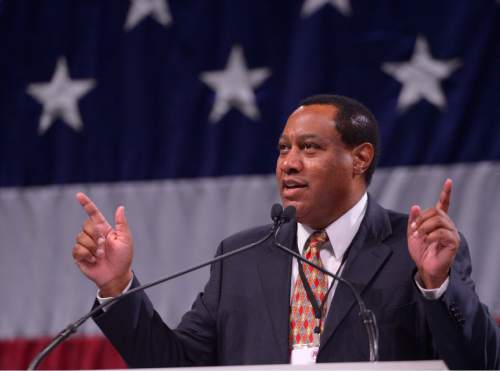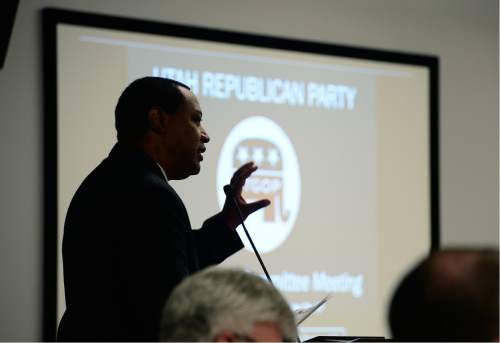This is an archived article that was published on sltrib.com in 2016, and information in the article may be outdated. It is provided only for personal research purposes and may not be reprinted.
The Utah Republican Party says it will not appeal court decisions that upheld a new law allowing candidates to gather signatures to qualify to appear on primary election ballots, and instead will seek political solutions through the Legislature.
Party Chairman James Evans said Thursday that the GOP's central committee made that decision after months of studying its various options.
The law, SB54, allows qualifying for the ballot through the traditional caucus-convention system or by collecting signatures — or both. Party delegates dislike that the law dilutes their power by allowing some candidates to sidestep them. The GOP filed, but lost, lawsuits contending the law is an unconstitutional interference with its powers.
Evans said the party will continue to ask legislators to repeal SB54, but acknowledges that that is not likely because of "current political realities." So it will focus more on seeking some tweaks to the law instead.
Evans said the central committee passed a resolution last weekend "that says we will not proceed with the appeal if the Legislature addresses the 'plurality issue,'" or how to deal with primaries where no candidate achieves a majority of the vote.
In such cases, some have suggested holding a run-off election between the top two finishers, or instead allowing party convention delegates to choose a winner — an option many delegates prefer.
"We didn't think it was wise to try to predetermine what that should ultimately look like, other than the final result should be that the winner has a majority," Evans said.
Gov. Gary Herbert, House Speaker Greg Hughes and Senate President Wayne Niederhauser sent a letter to the party's central committee vowing that the issue will be addressed during the 2017 Legislature, Evans said.
That concerns Rich McKeown, executive co-chairman of Count My Vote, the group that once conducted a petition drive to require open primaries where all candidates would qualify by collecting signatures. When its success loomed, SB54 passed as a compromise to also preserve the traditional caucus-convention system as an alternative.
McKeown said his group strongly opposes the option of allowing convention delegates to decide a winner when no one initially wins a majority in a primary contest. That would be "precisely contrary to the purpose of Count My Vote. It was designed with the notion that the people, not delegates, should elect candidates."
McKeown added, "I think we have arrived at a place where we have the right balance between the purpose of a party and the principle of people being able to vote."
He also said he doesn't see a problem with allowing someone to win by a plurality, and says it has happened many times in Utah history. He noted that former Gov. Mike Leavitt, one of the founders of Count My Vote, "was elected in 1992 with 43 percent of the vote" against Democrat Stewart Hanson and independent Merrill Cook.
Evans, however, said SB54 could allow five or more candidates to appear on a ballot, meaning a winner could have as small of a share of the vote as about 20 percent.
Evans said the party may also seek some other tweaks to the law at the Legislature, including how to handle signature gatherers who make false claims — which he contends happened often this year to help some qualify for the ballot.
Evans said a major reason the party chose not to appeal its court losses was because of the results of this year's primary. All the legislative candidates who qualified for the ballot only because they used the new option of collecting signatures were defeated by people who went through the caucus-convention system.
"That told us that people are showing preference for people who go through the convention system," and that the party still has a powerful role, he said. "The caucus-convention system produces better candidates because they are more thoroughly vetted."
Like several other candidates, Gov. Gary Herbert went through convention and gathered signatures. Herbert finished the convention 10 points behind challenger Jonathan Johnson, but then went on to trounce the delegates' preferred candidate in the primary.
When asked if the party would appeal court decisions if the Legislature fails to address the plurality issue to its liking, Evans said, "It's hard to fathom that would not be worked out because there is enough support behind it."
Twitter: @





